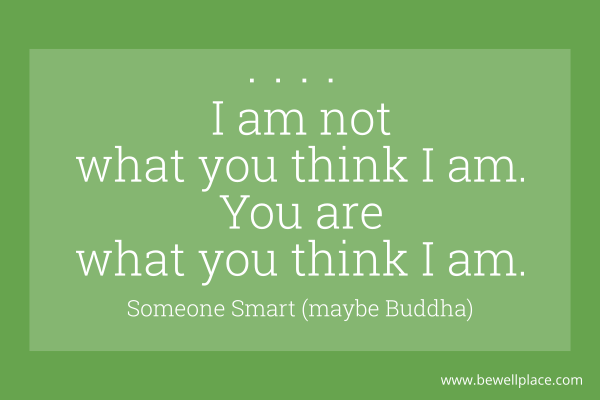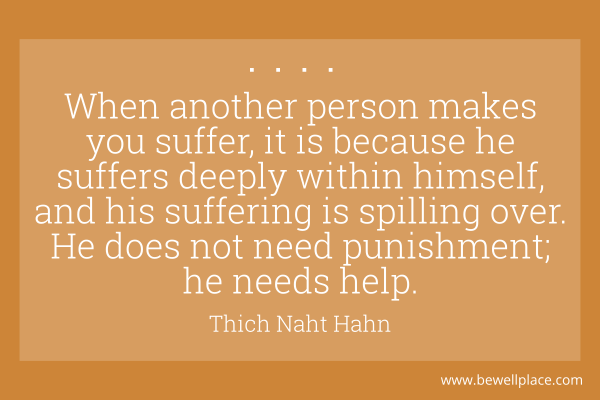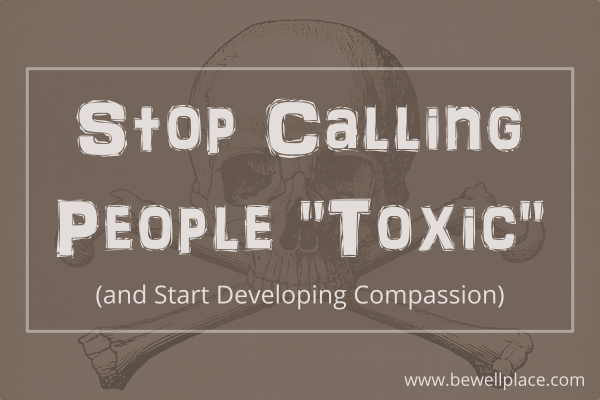You see it everywhere: How to Remove Toxic People From Your Life, How to Handle Toxic Friends, and Signs You’re in a Toxic Relationship. Stop it. Just stop it. Stop calling people toxic.
Calling people toxic gives us a sense of power and righteousness. It relieves us of responsibility and justifies our feelings and circumstances.
Though it’s true that some people in the world are bad news bears, nothing productive comes from placing ourselves on a pedestal above them.
Characteristics of a Toxic Person
Toxic people are typically associated with the following character traits:
- Bullying
- Manipulative
- Passive-aggressive
- Jealous
- Selfish
- Egotistic
- Narcissistic
The list goes on. Let’s take a minute to reflect on these characteristics.
Can we honestly say that we have never exhibited any of these traits in our lives thus far? Have we never been jealous before? Have we never been selfish? Do we never think and act in egotistic and narcissistic ways?
Come on…yes we do. We’re human. It’s all part of the gig.
The goal is to not let such tendencies become a habit. When we observe others who allow these tendencies to become a habit, we call them toxic and tell ourselves that they are very bad no good people and should be avoided at all costs.
Sure, yes. Who wants to hang out and work with difficult, selfish people all day long? Not I said the cat.
But is it really necessary to judge and scorn? No. No it is not.
Maybe You’re the Toxic One
We commonly judge in others what we dislike in ourselves. This quote says it the best:

When things don’t go your way and people don’t behave as you’d like, how do you respond? When you feel insecure or inferior, how do you treat the people you claim to love? When you find yourself in the same unproductive type of relationship, who do you blame?
It’s easy to hold other people responsible for our happiness, and it’s easy to label them as toxic when it seems they are irresponsible with our feelings. We quickly forget that we are the only ones in charge of our emotions and actions and end up thinking selfish, angry thoughts as a result.
But this behavior is exactly what these so-called toxic people exhibit. So the question becomes: Who’s really the toxic one?
Calling People Toxic Isn’t Helpful
Calling people toxic is a way for us to feel better about ourselves and escape responsibility for our own thoughts, feelings and actions. It’s a way to assess blame and elevate ourselves rather than evolve and gain deeper understanding of people and relationships. Toxicity is a distraction from the underlying problem.
The more we accept personal responsibility for ourselves, the less we need to place blame on others and hold others accountable for how we feel.
But there’s no need to place blame on ourselves either. Blame is counterproductive to personal growth. Mistakes happen. We all make them. The most important thing to do is recognize the mistake, understand it and take measures to prevent the same mistakes from happening again. No finger pointing. No blame games.
So, the next time you see one of those “detox yourself from toxic people” images on Pinterest, resist the urge to indulge in the popular foolery. Instead, start developing compassion for people who mistreat and project their own personal insecurities onto others. You don’t have to be best friends with them, but you certainly don’t have to perpetuate the problem.
Let’s be the change. Let’s refuse to blame and simply accept that we are all at different emotional stages in life. Let’s love ourselves enough to surround ourselves with people who appreciate and respect us, but let us not condone those who do not love themselves.

Subscribe!
Enter your email address and receive inspiration right to your inbox.
Please check your email and click on the confirmation link to complete your subscription.
![]()


I just love this. Glad to see other people feel the same way about this topic. Great article!
Hey, MB! Thanks for commenting. When we classify certain people as “toxic,” we only toxify ourselves. Acceptance, compassion, and letting go are much healthier strategies. Be well!
Lovely article. I’m sharing this. Labeling people “TOXIC” dehumanizes them. That person is transformed in your head into a substance, a poison with no feelings, no soul, no worth. They are people, not poison. They probably love their kids and their dog. I feel I can label actions/words as toxic, without labeling that person as toxic. I think using psychology terms is the new curse word – it both serves to attack and insult your opponent, and makes you look smart and educated. Narcissist is another psychology term that is over-used as a generic insult.
While I agree that we are all ultimately responsible for our own life journey, there are times when toxic parents can do so much damage to children that they do need to be held responsible for their actions. Yes, they too were emotionally abused as children and passed this on to their children etc. We feel badly that they had to go through this but it is not a pass to be abusive to others. When simply asked to stop their demeaning behaviors, they can’t. “How dare you judge us!!!” “You ungrateful child!” Sometime people ARE toxic and you do need to break the relationship for your own well being. Especially in the most intimate relationship we have…..parent and child. Sometimes toxic people are too wrapped up in protecting their shame and guilt and are so afraid of judgement that they can’t be reasoned with. The sorrow of this is beyond words. Now the adult child moves on, breaks the cycle and becomes the best person they can.
Hi Linda, I know exactly where you are coming from but there is no higher value in life than your family. And I do believe that in some cases maybe there is no way out of that vicious cycle, but generally Rachael is right it is much easier to blame others rather than to understand that no one is perfect and even though it is difficult we should work on resolving the problems not to ran away from it. Shutting out your parents and not even giving them a second chance is cowardice. We all deserve second chances. I feel like you are my own child who doesn’t want to talk to us and blames us for everything that went wrong in our family. I know we, I, screwed it up to badly that I cannot write this short message without tears in my eyes. I admitted to out son that it was all my fault and I apologized. I am ready to get on my knees and beg, but he doesn’t let me do that because he cut himself off entirely. Doesn’t answer our calls, emails, nothing. We never raised on hand on him, yes my wife and I argued a lot, but it was never due to alcohol or drugs but rather to our stupidity and my ego. All we want is a second chance. Is it too much to ask of your own child? How are you going to feel if your own child will blame you for things you have not done knowingly? It is our fault that we give our children everything, and we spoil them, we worry and care for them so much we shelter them from real life too much. And then when they come across their own life struggles they blame their parents? For what? Is that what you call being toxic? It’s not fair. We all need to fight for our families to survive, and not just the parents but the children as well. Did you really tried to reason with your parents? Maybe they were not ready, try again, and again, and again, just like we are trying in our family, because nothing in life is more important than your family.
Rick, I so relate to your post! We have 8 children…all grown…the bitterness of 2 daughters and a son is palpable. (The son WAS abusive to the girls, who did not inform my husband and me of what was going on.) The girls have gone to “therapy” and get to present their side but I venture to say the therapist would see things much differently were the rest of the family to be involved. They’ve pretty much gone “no contact” and, truthfully, other than my broken heart, life has been peaceful between the rest of us. So, I wonder who the “toxic” ones are. There is an epidemic of bitter grown children who are so unhappy with themselves that they can’t look within and change, they must blame and punish the ones who loved and served them most. Whether we were too this or too that (no abuse on our part, just trying to figure out this parenting thing) doesn’t warrant their behavior.
I disagree. There are too many abandoning the most precious relationships in their lives because of these pop-psychology phenomenon. It is fad. It is selfish. When you stop communicating in a relationship and accuse the one you abandoned as having a problem communicating, it is design without logic. “Breaking the cycle?” Abandonment of a parent or person without any effort at reconciliation is damaging. It is less than human. You then become the abuser.
Mark! That was soooo well said!
Love this article. No one is perfect and nothing is more annoying than imperfect people expecting perfection from others.
Very well written and inspirational for me. Thank you
Love! Thank you for such a well written response to the newest buzz phrase ” toxic person”.
I do share Rachaels point of view, however for what I have read and be able to comprehend, the article is also describing a pathology, which is not just an attitude right?, like we all can be upset time to time, or not be too friendly time to time, or make mistakes of judment unintentionally, or be intentional time to time, we all are humans and not perfect. However there are pathologies well documented, personalities that tend to a psycopath or sociopath behavior. Which means, they lack empathy, and it is real. A pathological lack of empathy has no rehabilitation. Something to meditate on. Thank you Rachael for your valuable insight on this matter, and provide with a different scope of something that is of great interest for many people. Best regards
I don’t think you’ve ever met some of the people that I have met in life. people who actually want to destroy humiliate degrade others for their enjoyment. I have met people who have murdered over and over again and enjoy the process of planning the murder in detail. I have come across serial rapist that have also planned their victimizing over and over for weeks before doing it because of the thrill of planning it was also part of it. But they would gladly do it again and again. I have met people who truly enjoy the act of snatching up children and turning them into sex slaves. I have met people who gave birth to a child and then beat them and tortured them until they died.
now I recognize that having worked in the high-security prison I have seen things that the average person hasn’t seen. But these people exist and they are not just troubled and need help they are dangerous.
I think that it would be easy to say that you’re boyfriend is toxic because she argues with you rather than to deal with your part in the pattern of argument. But that is not what toxicity is that’s just a word thrown out and anger.
True toxicity exist. and no one is spiritually evolved if they walk around acting like they’re blind
I love this article. My ex just called me a toxic person and it hurts. Thank you for outlining the fact that we all have personal responsibility.
Very naive. Not helpful or realistic. You are ripe for manipulation, and you will be too weak to protect anyone who is hurt by toxic people. You’ll just contribute to the cycle because you won’t call it what it is, and the toxic person will strike again. They will not target you, though, because you aren’t a threat to them. In fact, you’ll enable them by shrugging off your responsibility to stand up for what is mentally healthy and right. You’ll get to feel good about yourself, though, because you didn’t call anyone any bad names. Who cares about the damage to others?
Lack of empathy!
Bruh it’s not like your behaviour is perfect, you’re showing a lack of empathy- I’m not saying you should be friends with people who show toxic behaviours but still treat them like normal people and give the, advice, that’s empathy.
I appreciate this perspective very much. My significant other (ex husband who I reconciled with) and son (from a relationship when I was a teenager he is now 22) tell me I’m toxic and selfish and it cuts right through me like a knife. I’ve been searching for answers as to why they think this way. I’ve given so much. It happens during a time when I am most depressed and insecure. I don’t mean to be toxic. I’m just hurt.
Thank you for your wisdom and beautiful article.
Radiant Blessings,
Jenn
Oh interesting. Throughout some of my interpersonal relationships I’ve been accused of such. Toxic this, toxic that. Then I found out those muppets have their own share of people who are pissed at their behaviour. By general definition, it’s true some people are plain overbearing and super controlling. Another, subjective. Eg; I love rock music, can be edgy at times but not entirely a hopeless or evil character. It’s just my taste. Some would regard it as ‘Toxic’. Would that person be toxic since they’re intolerant and superficial?
And I totally love the article’s point, like is it fair to coin someone toxic especially in unmoderated conflicts? Is there check and balance being administered for fairness in the accused defenses? I think the greatest irony is when the party who is using that word a little too much are doing it for the sake of deflection itself. That’s quite manipulative and toxic of themselves. Toxic and how it’s being described can be really lose.
This is a wonderful post.
Thank you.
A lot of these pop-culture catch-phrases are taking the place of learning of how to deal with other people and one’s own feelings. This in particular has become so ingrained into society and it is very detrimental. Calling another person toxic is so often and casually used it has become normal- and it never sat well with me but I didn’t quite know how to articulate it.
It’s impossible to feel compassion for another WHILE in a toxic conversation or relationship. Afterwards, after healing, YES.
The issue is not with the word ‘toxic’. It’s how we use it to communicate.
When you say ‘I don’t feel good about this. This feels toxic to me. I’m leaving’. then you are communicating and speaking your truth at the same time. The ‘i’m leaving part becomes a natural conclusion after admitting that the relationship feels toxic to you. Don’t overthink this. If something feels painful, don’t go buddha on yourself and force yourself to feel compassion for the other while you are suffering. Distance yourself from the pain FIRST. Protect yourself, FIRST. Compassion for the other, afterwards, is part of your own healing.
When you say ‘You’re toxic!’, then you’re not communicating, then you’re analysing and accusing, trying to control the other and not staring into your own painful experience. This way, many people never reach the conclusion to leave. That’s how they get hurt.